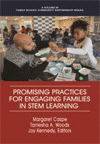
Promising Practices for Engaging Families in STEM Learning
Edited by:
Margaret Caspe, National Association for Family, School, and Community Engagement
Taniesha Woods, Independent Consultant
Joy Lorenzo Kennedy, Databrary
A volume in the series: Family School Community Partnership Issues. Editor(s): Diana Hiatt-Michael, Pepperdine University.
Published 2018
The technology revolution has made it critical for all children to understand science, technology, engineering, and math (STEM) or risk being left behind. Promising Practices for Engaging Families in STEM Learning explores how families, schools, and communities can join together to promote student success in STEM by building organized and equitable pathways for family engagement across all of the settings in which students learn – including, schools, early childhood programs, homes, libraries and museums –from the earliest years through adolescence.
This thought-provoking monograph includes three main sections with chapters from leading thinkers in the field:
> The first section provides the theoretical and research base for the importance of family engagement in STEM and draws out the challenges and opportunities that exist– from the transmission of adults’ anxiety and lack of confidence in their own STEM skills, to inequalities in out-of-school learning opportunities, to biases and misconceptions about the kinds of STEM supports offered by families from low-income and immigrant homes.
> The second section builds on this research by presenting success stories, best practices, and approaches to engaging families in STEM.
> The final section focuses on how policies at the local, state, and federal level can support the promotion of family engagement in STEM.
Taken together, the monograph shows that STEM is a powerful mechanism to connect, engage, and empower families.
> STEM provides opportunities for parents and children to spend time together asking fun and meaningful questions that link in-and out-of-school learning.
> STEM creates new experiences for families to co-construct and support learning with their children from the earliest years throughout formal schooling and onto college and career pathways.
> STEM also presents possibilities for families to build confidence and agency in supporting children’s interests; especially those families who might be marginalized because of their economic or language status, race, or culture.
CONTENTS
The 5Rs: Research-Based Strategies for Engaging Families in STEM Learning, Margaret Caspe and M. Elena Lopez. Supporting Science, Technology, Engineering, and Mathematics (STEM) Learning by Helping Families Overcome Math Anxiety, Talia Berkowitz, Marjorie W. Schaeffer, Christopher S. Rozek, Sian L. Beilock and Susan C. Levine. Listening for Strengths in Diverse Families’ Conversations about Science, Graciela Solis and Maureen Callanan. Culturally Competent Mathematics Instruction for African American Children: A Review of Promising Practices in Schools, Classrooms, Homes and Communities, Jeffrey Brown, Cassandra Schreiber, and Oscar A. Barbarin. Using a Behavioral Economics Perspective to Boost Family Engagement in the Getting Ready for School Preschool Intervention, Helena Duch and Lisa A. Gennetian. Supporting Family Engagement in Science, Technology, and Engineering (STE) Curriculum among Low-income Immigrant Families with Preschool Children, Christine M. McWayne, Jayanthi Mistry, Kimberly Brenneman, Betty Zan, and Daryl Greenfield. Collective Impact Approach to STEM: The Case of Iridescent, Tara Chklovski and Maggie Jaris. Interactive Digital Storybooks and the Role of Parents in Supporting Young Children’s Mathematics Development, Colleen Uscianowski, Ma Victoria Almeda, and Herbert Ginsburg. NYSCI Neighbors: Creating Locally-Driven Authentic Opportunities for Immigrant Parents in a STEM Ecosystem, Andrés Henríquez. Policy Supports for Family Engagement in Early STEM, Matthew Weyer. How the National Science Foundation Supports Family Engagement in STEM Learning, Joan Walker. About the Authors.
-
Paperback978-1-64113-280-0
Web price: $45.04 (Reg. 52.99)
-
Hardcover978-1-64113-281-7
Web price: $80.74 (Reg. 94.99)
- eBook978-1-64113-282-4

- EDU029030 - EDUCATION: TEACHING METHODS & MATERIALS: Science & Technology
- EDU022000 - EDUCATION: Parent Participation
- EDU051000 - EDUCATION: Learning Styles
-
 Composing Storylines of Possibilities
Immigrant and Refugee Families Navigating School
Composing Storylines of Possibilities
Immigrant and Refugee Families Navigating School
-
 Critical Perspectives on Education Policy and Schools, Families, and Communities
Critical Perspectives on Education Policy and Schools, Families, and Communities
-
 Family and Community Partnerships
Promising Practices for Teachers and Teacher Educators
Family and Community Partnerships
Promising Practices for Teachers and Teacher Educators
-
 Family Involvement in Faith-Based Schools
Family Involvement in Faith-Based Schools
-
 Promising Practices for Engaging Families in Literacy
Promising Practices for Engaging Families in Literacy
-
 Promising Practices To Empower Culturally And Linguistically Diverse Families Of Children With Disabilities
Promising Practices To Empower Culturally And Linguistically Diverse Families Of Children With Disabilities
-
 The Power of Community Engagement for Educational Change
The Power of Community Engagement for Educational Change

